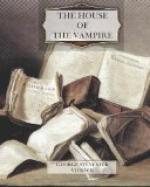So when Walkham sent her an invitation to one of his artistic “at homes” she accepted, in the hope of meeting Reginald. It was his frequentation of Walkham’s house that had for several years effectively barred her foot from crossing the threshold. It was with a very strange feeling she greeted the many familiar faces at Walkham’s now; and when, toward ten o’clock, Reginald entered, politely bowing in answer to the welcome from all sides, her heart beat in her like a drum. But she calmed herself, and, catching his eye, so arranged it that early in the evening they met in an alcove of the drawing-room.
“It was inevitable,” Reginald said. “I expected it.”
“Yes,” she replied, “we were bound to meet.”
Like a great rush of water, memory came back to her. He was still horribly fascinating as of old—only she was no longer susceptible to his fascination. He had changed somewhat in those years. The lines about his mouth had grown harder and a steel-like look had come into his eyes. Only for a moment, as he looked at her, a flash of tenderness seemed to come back to them. Then he said, with a touch of sadness: “Why should the first word between us be a lie?”
Ethel made no answer.
Reginald looked at her half in wonder and said: “And is your love for the boy so great that it overcame your hate of me?”
Ah, he knew! She winced.
“He has told you?”
“Not a word.”
There was something superhuman in his power of penetration. Why should she wear a mask before him, when his eyes, like the eyes of God, pierced to the core of her being?
“No,” she replied, “it is not love, but compassion for him.”
“Compassion?”
“Yes, compassion for your victim.”
“You mean?”
“Reginald!”
“I am all ear.”
“I implore you.”
“Speak.”
“You have ruined one life.”
He raised his eyebrows derogatively.
“Yes,” she continued fiercely, “ruined it! Is not that enough?”
“I have never wilfully ruined any one’s life.”
“You have ruined mine.”
“Wilfully?”
“How else shall I explain your conduct?”
“I warned you.”
“Warning, indeed! The warning that the snake gives to the sparrow helpless under its gaze.”
“Ah, but who tells you that the snake is to blame? Is it not rather the occult power that prescribes with blood on brazen scroll the law of our being?”
“This is no solace to the sparrow. But whatever may be said, let us drop the past. Let us consider the present. I beg of you, leave this boy—let him develop without your attempting to stifle the life in him or impressing upon it the stamp of your alien mind.”
“Ethel,” he protested, “you are unjust. If you knew—” Then an idea seemed to take hold of him. He looked at her curiously.
“What if I knew?” she asked.




